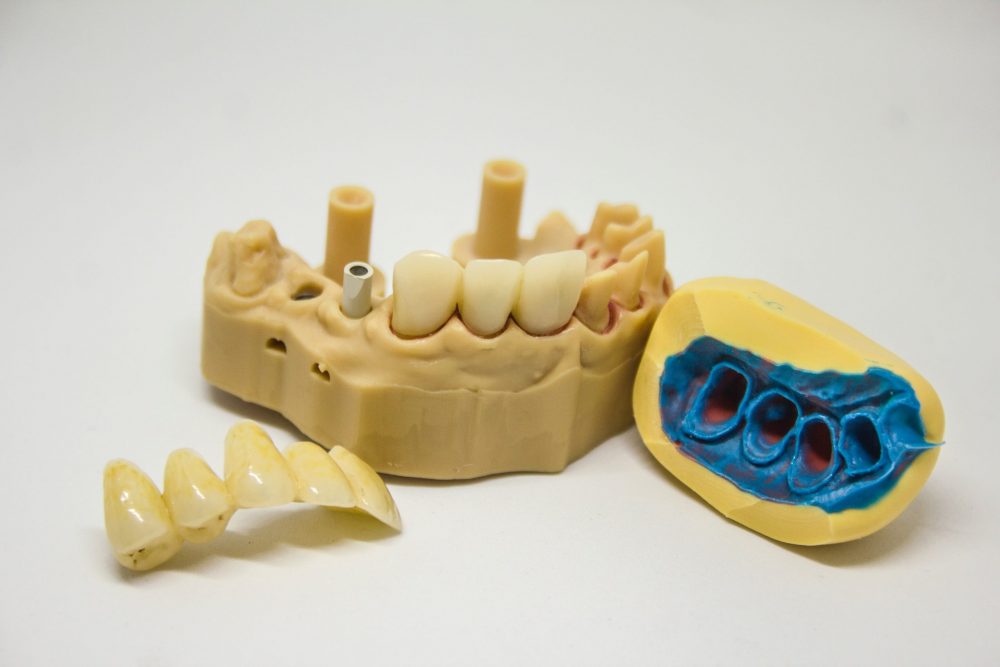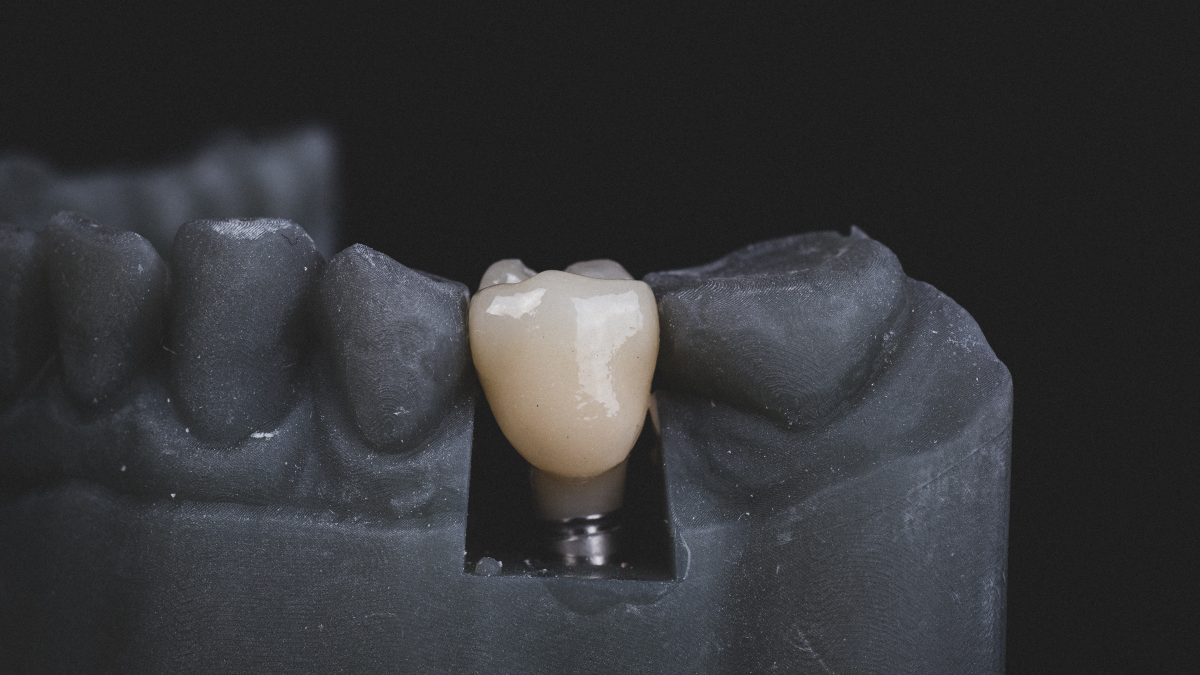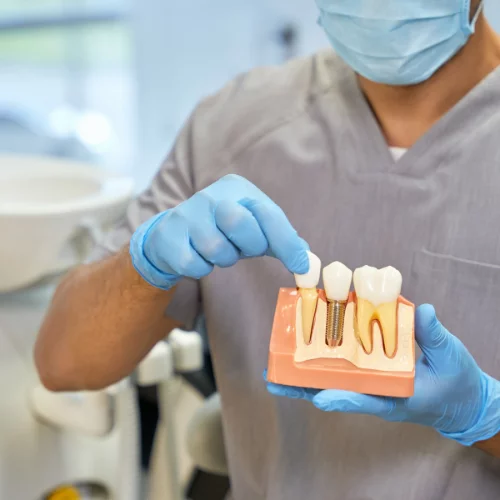
Can Invisalign Fix Gaps in Your Teeth?
January 3, 2022
Overdentures vs Implants: Let’s Break it Down for You
February 11, 2022The field of dentistry constantly improves over time to provide patients with better care and more natural-looking solutions for replacing or repairing teeth. Among these innovations are teeth implants. Those considering these as a way to replace one or more missing teeth will often ask us at Matthews Family Dentistry, “Are dental implants permanent?” Let’s break down the answer to make an informed decision about getting implants.
What Are Dental Implants?
Dental implants use the body’s system to create a life-long tooth replacement. Traditionally, gaps in the teeth would require a bridge to correct. Dentures would replace the smile for those missing most of their upper or bottom teeth.
Today, another option exists to help anchor bridges or dentures or replace individual missing teeth – dental implants. The dentist takes advantage of the jaw bone’s natural ability to heal and grow to place lifelong replacements for missing teeth or sites to fix dentures or bridges.
The implant consists of three parts. The first is the actual titanium implant that goes directly into the jaw. After the dentist places this part through surgery, the patient takes time to allow their jaw to naturally grow around the implant and hold it firmly in place.
Once the jaw successfully fuses with the base, the final two parts of the implant restoration go into place. These parts are the post and the crown. The post provides a place for the artificial tooth to connect to the screw in the jaw. The crown is the replacement tooth that is designed to fit with the rest of your teeth. For implant-supported overdentures or a bridge, the implant posts and crowns serve as anchors to hold the fixtures in place. By securing the dentures in place, the implants allow for a more comfortable, natural-looking smile.
The installation of the crown completes the implant, which looks and feels just like the other natural teeth. Since the jaw holds the implant in place, it will not become loose or fall out. Plus, this procedure encourages bone growth in the jaw instead of loss, as can happen after losing a tooth.
Who Needs Teeth Implants?
Dental implants are for anyone who is missing one or more teeth. Since they rely on healthy bone to hold the screw in place, some patients may require a bone graft to add bone to the area for the implant. This procedure adds another step but helps to ensure the success of the implant and its permanency.
For individual teeth, implants fill gaps and prevent movement of the other teeth, which keeps your smile straight. The implant feels like a natural tooth and is ideal for any adult patient, young or old, who loses a permanent tooth.
Those who need dentures or bridges can also benefit from implants. The implants serve as fixture points or anchors for dental work. Since the dentures or bridges attach directly to the implants and snap easily into place, they hold firmer than dentures that require adhesive. Also, with permanent implants to keep them in place, these types of dentures fit better in the mouth.
Ideal candidates are those with healthy bone and gums in the implant area, avoid smoking, and commit to keeping the rest of their teeth healthy with regular dental care. If you are missing a tooth, have several teeth missing, or need a tooth pulled, talk to your dentist about the possibility of dental implants for you.
What Is the Procedure to Get Implants?
To get dental implants, you will need surgery. However, because the implants last for life, you should not need to repeat the process for the same tooth. The first step in getting an implant is having the dentist examine your teeth and bone to determine if you need a bone graft. Surgery to augment the bone is only needed for some patients. Most don’t need this step and can go straight for their implant.
During the implant procedure, the dentist places. Your bone will grow around this to hold it firmly in place. The healing process allows the implant to become a permanent fixture.
After healing, the dentist will place the post and crown on top of the screw. These are the surface-level parts of the implant. If you take care of the crown and your surrounding teeth, it will last you for life. For those who have implant-supported overdentures, the crowns serve as the fixture points for the dentures.
How Long Do Implants Last? Are Teeth Implants Permanent?
Teeth implants last much longer than other restorative dental fixtures. For example, bridges typically only last 10 to 12 years. However, as long as you maintain basic oral health, implants can last for life. Therefore, if you need a permanent replacement for one or more teeth, ask about implants as a permanent solution for missing teeth.
How to Care for Dental Implants
The best way to ensure that your dental implants last for the rest of your life is to take care of them and the surrounding teeth. You should still keep up with twice-yearly dental exams and cleanings. These appointments will help your dentist identify if you have problems with your other teeth and fix them before the issues cause you to lose more teeth. Also, make sure that you continue to brush all your teeth and floss around the implant. Remember that food can still get stuck between the implant crown and your natural teeth, which can cause cavities in your teeth if left in place. Flossing and brushing remove these particles and protect the health of your entire smile.
Thinking About Dental Implants? Contact Us at Matthews Family Dentistry to Find Out If These Fixtures Are for You
Whether you have one or more teeth missing, contact us to schedule a visit with one of our dentists to find out if dental implants are best for you. You can find out for yourself that the answer to “Are dental implants permanent” is a resounding yes, which can save you money over time and offer you more comfort compared to traditional dentures. Let us help you show off a beautiful smile with teeth implants or other dental care services.




